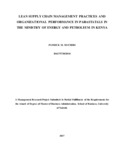| dc.contributor.author | Muchiri, Patrick M | |
| dc.date.accessioned | 2018-01-23T10:03:38Z | |
| dc.date.available | 2018-01-23T10:03:38Z | |
| dc.date.issued | 2017 | |
| dc.identifier.uri | http://hdl.handle.net/11295/102606 | |
| dc.description.abstract | The general objective of this study was to determine the impact of lean supply chain management practices on organizational performance of Parastatals in the Ministry of energy and petroleum. The specific objectives of the study were; to establish the lean supply chain management practices adopted by Parastatals in the Ministry of energy and petroleum, to establish the impact of lean supply chain management practices on organizational performance and to establish the challenges in implementation of lean supply chain management practices. The study utilized resource dependence theory, transaction cost analysis and theory of constraints. This study adopted a descriptive research design to examine the impact of lean supply chain practice on organizations performance. The target population of this study included all 8 Parastatals in the Ministry of Energy and Petroleum. This study collected primary data using a questionnaire. Descriptive statistics mainly frequencies, percentages, and mean were used to summarize the responses. Linear regression will also be applied to model the relationship between the dependent variable and the independent variables. The study findings revealed clearly that parastatals in the ministry of energy and petroleum adopts specific lean supply chain management practices that are aligned to its corporate strategy in running its value chain function and these lean supply chain practices have significantly contributed to the performance and hence creating competitive edge in the very parastatals in the ministry of energy and petroleum by focusing on operational effectiveness and efficiency. The study concludes that the adoption of lean supply chain practices improves the organizational performance. The improved performance is reflected through minimized waste in manufacturing process, reduced manufacturing cycle time, improved working capital, reduced customer lead time, increased space saving and increased response to customers. The study recommends that Lean supply chain need to be embraced to help the management team appreciates the direct impact of these initiatives. | en_US |
| dc.language.iso | en | en_US |
| dc.publisher | University of Nairobi | en_US |
| dc.rights | Attribution-NonCommercial-NoDerivs 3.0 United States | * |
| dc.rights.uri | http://creativecommons.org/licenses/by-nc-nd/3.0/us/ | * |
| dc.subject | Lean Supply Chain Management Practices and Organizational Performance in Parastatals in the Ministry of Energy and Petroleum in Kenya | en_US |
| dc.title | Lean Supply Chain Management Practices and Organizational Performance in Parastatals in the Ministry of Energy and Petroleum in Kenya | en_US |
| dc.type | Thesis | en_US |



